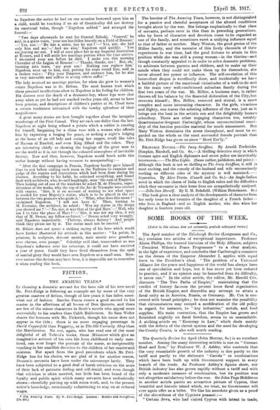SOME BOOKS OF THE WEEK.
[Notice in this column does not necessarily preclude subseptent review.]
The April number of the Edinburgh Review (Longmans and Co., 60.) contains two articles of exceptional importance. Professor Alison Phillips, the learned historian of the Holy Alliance, subjects "President Wilson's Peace Programme" to a clear analysis, in the light of experience, and concludes that Castlereagh's comment on the dream of the Emperor Alexander I. applies with equal force to the President's ideal. "The problem of a Universal Alliance for the peace and happiness of the world has always been one of speculation and hope, bnt it has never yet been reduced to practice, and if an opinion may be hazarded from its difficulty, it never can." In the other article, the editor, Mr. Harold Cox, discusses "The Two Paths of Empire," maintaining that the verdict of history favours the present loose fiscal organization of the British Empire, and discredits any attempt to attain a fiscal unity as in America, Russia, or Germany. Mr. Cox is con- cerned with broad principles ; he does not examine the possibility that circumstances may compel a modification of the old policy in regard, for instance, to "key industries," metals, and food supplies. His main contention, that the Empire has grown and flourished mightily on fiscal freedom, seems to us unassailable. A striking article on "Economy in Law," which deals mainly with the defects of the circuit system and the need for developing the County Courts, is also well worth reading.


































 Previous page
Previous page